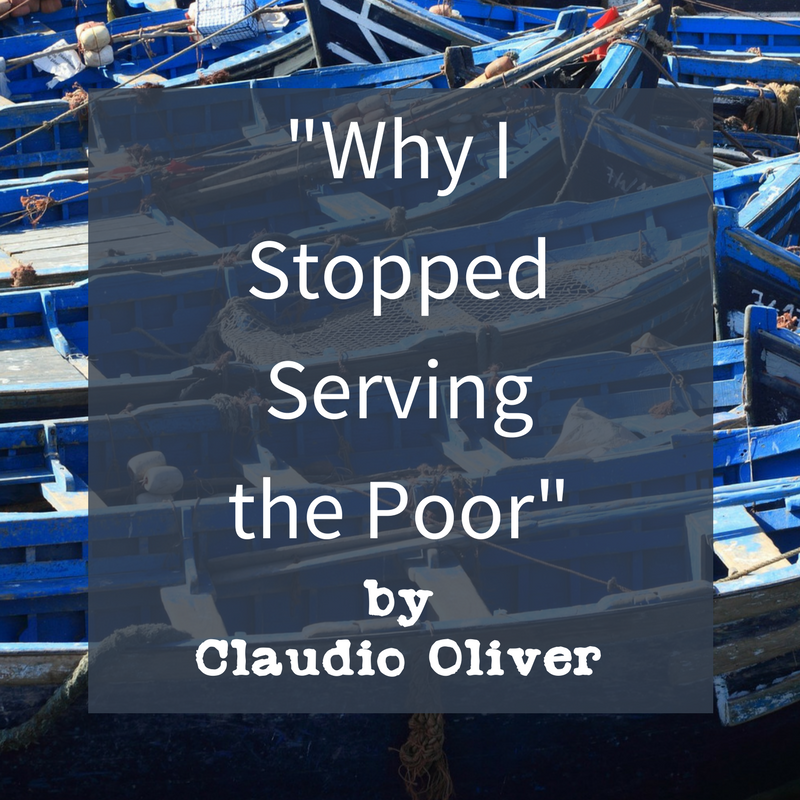 We want to be sensitive that @HonestMissnary does not publish a lot of details of his life for the sake of his ministry. The questions I have asked him here are based on Joe Holman’s blog “Ten Things That Your Missionary Will Not Tell You.” I highly recommend you read that blogpost, and we all look forward to our interactions on Thursday during the #JustMissions chat on long-term missionary life with @HonestMissnary who we call ‘Honest’ in this article. Honest and his family are American from the state of Louisiana. They have been on the field for over four years. He and his wife have Bible college degrees and are able to use those degrees on the field. They live in Latin America. “Our service to this country is through two very different ends of the spectrum. I teach through a discipleship ministry in a local state prison here and teach a Bible study with children at an abused women’s shelter. My wife teaches the mothers and girls (12+ years) while our children and I teach the children so that their mothers can have a ‘church service’. That is how my wife refers to her ministry as bringing church to these ladies.” Honest and his family serve the women’s shelter throughout the week as well. Honest said he doesn’t claim any particular denomination. “While we grew up in non-denominational Bible churches, served in Baptist churches and currently attend a Presbyterian church; I really don't know if I could say we are a denomination nor are affiliated denominationally as missionaries.” Honest’s wife homeschools their preteen and teen who he said have done well on the mission field. “They have national friends as well as North American friends, and we could not be more proud of them. Their willingness to learn the language and be flexible has been amazing. We are so thankful by their adjustment to the field that we often wonder how it happened so well. We thank God alone for that answer to prayer.” Difficulties on the Field & Family Matters “Difficulties of living in another nation could fill the pages of a thousand books, and while there are many books on the subject I really don’t think anyone can say what is difficult for someone else in another culture,” Honest said. Some of the things that are particularly difficult for him include learning to drive where he lives, using public transportation, seeing other missionaries that are starved for attention despite the many people that surround them, and learning another language. “While I believe we all speak well getting to the same level as a national will take years and years of submerging oneself in the culture. We came to this country with basic knowledge of words and not even the structure of the language and four years into it, I still give people the deer in the headlights look. We have encountered many wonderful people who are very patient and kind with our learning and that helps so much.” Honest said that his family feels at home on the field. “To be honest, this country is home for us. When I correspond with people, this is home and the States is well…the States. I think the main reason it is difficult to feel like we belong is that this culture is very family-oriented and when you have no family to orient with you feel left out,” he said. Honest said the family has attended two churches before the one they are currently at and it’s been a huge help in their progress. “I will say that our church now is turning that corner for us. We feel so welcome and invested in, including the lives of our children. While we do not have family here we have begun to build relationships that hopefully will change that.” Returning ‘Home’ to the States “Returning to the States is difficult because people have expectations of what your coming back looks like and how it should happen. They have expectations of who you should see, how much time you should spend with them, etc. Unspoken expectations from family, churches, and individual supporters can make a missionary’s time in the States so much harder than their life in another culture. Most of the time a missionary is not in the States for vacation; they are there to raise support which means working double time talking about the work they do on the field.” He said that friends and family want to see them when they go home, and he wants to see them. “But we also want to take a breather and relax and adjust to an ever-changing memory of where we used to live. Challenges going back to the States means planning ahead and planning well ahead for your ministries as well as trusting them into the hands of nationals or other missionaries who are partners in ministry. Sadly because some missionaries are not able to let go and allow others the opportunity to learn to be leaders they never leave the field unless absolutely necessary or because of health issues which can be one in the same.” Ministries get put on hold often when long-term missionaries return to the States. “Thinking about our ministries, wondering about the people is all part of the job but it doesn't make it any easier knowing your ministries are ‘on hold’.” Honest said it’s hard for others to imagine the struggle. “Imagine if you took a two months trip to another country where paying your bills on the computer is pretty much unheard of, collecting enough money to pay bills in advance (if you can even pay them in advance), or planning your purchases knowing you will be judged for the money you spend on items such as clothes and other necessities you cannot purchase on the field. Being a missionary does not always mean a vow of poverty; and if a missionary does purchase some things to make their time on the field more palatable please let them feel free to do so. Unless you have picked up and lived in another culture, where the language is different from your own first tongue it is hard for people to understand what you go through to do what God has called you to do and they may never understand,” he said. “God does give us the grace to do what he has called us to do, it would be nice to get that same grace from friends, family, supporters, and churches.” Short-term teams He has a suggestion for those who participate in short-term missions, stating that short-term mission goers don’t fully understand long-term missionary life unless they are intentional about learning. “If you really want to know what it is like for a missionary come spend a week or two with them doing what they do, day in day out. Go with them to pay bills, to shadow them on a daily basis. That person will walk away with a different perspective on what goes on in the life of a missionary. So many people walk away with a skewed perspective of missionaries because they only see them when they are tending to a team. That is not our everyday life and if it is for a missionary I don't see them staying healthy mentally, spiritually, or physically.” On Saying Goodbye “Going to the States and coming back home, while we look forward to our own house and bed, I think the hard part is not knowing when you will see them again and knowing in a few weeks time we will all be back to our routines with only the memories that popup on Facebook. We try to get to the States at least every other year.” Honest said it was a luxury that he and his family are on the same side of the world as the States. “On average we say goodbye every other year and even with FaceTime and Skype those tend to make missing the States even worse especially for holidays because no one really knows how to connect or pour their feelings out in front of others via these mediums.” Proof & Support Honest said that sadly financial support often comes with strings. “I think the pull to prove ourselves stems from being alone out on the field and making sure we are earning what is being sent to us. We don't punch a clock every day, we don't technically answer to anyone on a daily basis, and yet we feel like anything we post not related to ministry is judged as if we should be doing ministry 100% of the time. Part of the opportunity is that people who are giving feel like they have a say in what we do and how we do it; for some people our life is black and white and never any grey areas but most missionaries will tell you most of their life is a grey area with very little black and white.” “I could say our supporters are our boss, but the reality is they should be guided by God to give to our ministry and therefore allow God to lead us and guide us in our ministries. But Americans like to know if they are making worthy investments. This is between them and God and we can only present the facts of our ministries. Fact of the matter is that my boss is ultimately God; he led me to a ministry opportunity that I would never have imageined…prison ministry. This opportunity was not something I even remotely considered but have loved every day that I have gone for the past two plus years. Having the opportunity to invest in men who have come to grips with some of their sins and been saved is something I will cherish for all of my life. I could say that I am my own boss and while they may be somewhat true it is only based on my relationship with God and his Word; without that relationship my ministry would be a sham.” Pressure & Stigmas “Sometimes I do feel like we need to sound busy; never holier or better because I am not. I think that is the stigma with missionariesthat they are super spiritual but the reality is that what your relationship with Christ, Scripture, church, ministry is not going to become amplified when you get to the mission field. You won’t suddenly become super Christian, you will be who you are and your relationship will be what it was just add cultural stress, language learning stress, and a thousand other stressors.” “Help reduce the pressure for missionaries by getting to know them for who they are. Treating missionaries like they are real people not some super hero of the faith, knowing that they can get stressed out, giving them space and freedom to take care of their families which also means giving them the latitude for things like vacations, something extra for their kids’ birthdays if not for their own birthdays or anniversaries. Sadly, missionaries either don't take vacations (under-funded) or do take vacations (able to save) without anyone knowing about the vacation. This does not make for a healthy missionary. Feeling like someone is judging every purchase you make, every dollar you spend, every post that isn't ministry-related all adds up, and missionaries feel the brunt of that judgment. Pastors and churches can do a better job of teaching the congregation about missionaries; explaining some of the trials and successes we face before a missionary hits the ground. This means that pastors and mission committees need to get to know the missionaries they support.” Questions Q1 – What are some major difficulties of #CrossCulturalCommunication? #JustMissions Q2 – What difficulties exist in having two homes: a current home & a home country? #JustMissions Q3 – How can short-term #missions teams be more intentional about understanding a long-term missionary’s life? #JustMissions Q4 – What do you think are some of the grey areas of a missionary’s life that @HonestMissnary references? #JustMissions Q5 – Why do congregants often elevate #missionaries to #superhero status? #JustMissions Q6 – How can we who live in the States better support #missionaries sent out by our #churches? #JustMissions
1 Comment
Leave a Reply. |
Gena's
|

 RSS Feed
RSS Feed

